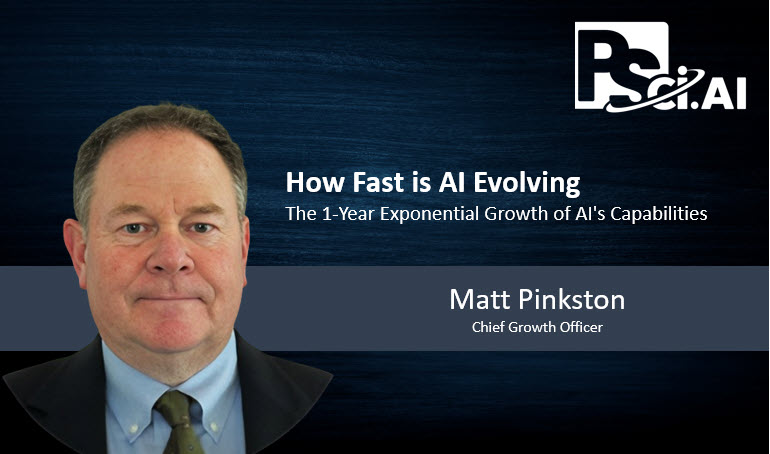
In the rapidly changing landscape of technological advancements, Artificial Intelligence (AI) has emerged as a shining star, especially in the past year. This article delves into the extraordinary journey of AI’s evolution and its profound impact on various sectors, including government contracting. Discover how AI, specifically Procurement Sciences’ Automated Bidding Intelligence System, is revolutionizing proposal development and helping businesses win Request for Proposals (RFPs) through its advanced capabilities.
Understanding AI for Government Contracting: Key Definitions
Before we explore how Procurement Sciences’ Automated Bidding Intelligence System is transforming government contracting, let’s clarify some essential terms:
- Large Language Models (LLMs) for RFPs: These are AI systems equipped with immense neural networks, boasting billions of parameters, making them ideal for processing and generating human-like text. They form the foundation of advanced AI applications tailored for government contracts.LLMs enable AI to comprehend complex RFP documents, extract key information, and generate detailed proposals with unparalleled accuracy.
- Generative AI for Capture and Proposal Writing: A cutting-edge branch of AI that creates original content, such as comprehensive proposals, tailored to specific RFP requirements based on learned data. Generative AI algorithms like GPT-4 have revolutionized capture and proposal writing by automating the creation of high-quality, customized responses.
- Context Window in AI for Government Contracting: This refers to AI’s ‘memory span’ during a task, determining how much text it can consider at one time when analyzing RFPs and crafting proposals. A larger context window allows AI to understand and respond to complex RFPs more comprehensively, ensuring proposals align perfectly with requirements.
- Tokens for Winning RFPs: Tokens are the smallest units of language, akin to words or parts of words, that AI utilizes to understand and generate text when pursuing government contracts. Tokens play a crucial role in AI’s ability to create precise and contextually accurate responses to RFPs, enhancing proposal quality.
AI’s Remarkable Ascent in Government Contracting
Just a year ago, AI’s capabilities, particularly in context understanding for RFPs, were akin to reading a short story—limited to about 3,000 tokens, roughly equivalent to 4-5 pages of text. It offered a mere glimpse, a snapshot of comprehension, rather than the complete narrative. In government contracting, this meant limitations in processing lengthy RFPs and crafting tailored proposals efficiently.
- AI’s limitations in context understanding hindered its ability to comprehend lengthy RFP documents or multifaceted topics.
- Its output was often fragmented, making it challenging to generate coherent and contextually accurate responses to complex RFPs.
- AI’s applications in government contracting were constrained to tasks with minimal text inputs.
However, in a mere span of 365 days, AI has witnessed a monumental transformation, driven by innovative solutions like Procurement Sciences’ Automated Bidding Intelligence System. It now boasts a context window of over 120,000 tokens, enabling it to comprehend and analyze the equivalent of a 500-page novel, making it a game-changer in the realm of government contracting.
- AI’s expanded context window, powered by Procurement Sciences’ system, allows it to process longer and more intricate RFP documents, engage in nuanced discussions, and understand complex topics comprehensively.
- The ability to analyze extensive texts in a single pass facilitates faster and more accurate information extraction, resulting in superior proposal quality.
- AI’s leap from 3,000 to 120,000 tokens signifies a qualitative leap into a new realm of intelligence and capability, revolutionizing its potential applications in government contracting.
AI’s Impact on Winning RFPs and Proposals
In the context of government contracting, this evolution translates into Procurement Sciences’ Automated Bidding Intelligence System’s ability to process extensive documentation, proposals, and historical data in previously unimaginable ways. It can meticulously analyze years of project data, unearth crucial insights, and even predict future trends—all in a fraction of the time it would take a human team.
- Procurement Sciences’ system, driven by AI’s enhanced capabilities, enables it to sift through vast amounts of data quickly, identifying key patterns and trends that may have been overlooked when crafting proposals for winning RFPs.
- Government agencies can now leverage AI, powered by Procurement Sciences’ system, to streamline the proposal evaluation process, making it more efficient, data-driven, and aligned with RFP requirements.
- The depth and breadth of AI’s understanding, amplified by Procurement Sciences’ solution, have a direct impact on the quality of proposals, making them smarter, more strategic, and more compelling, increasing the chances of winning government contracts.
The Future of AI in Government Contracting with Procurement Sciences
As AI continues to evolve, the potential applications are boundless. We’re advancing towards a future where AI’s understanding and analysis, driven by innovative systems like Procurement Sciences’ Automated Bidding Intelligence System, will not just be a tool but a foundational aspect of strategic decision-making in industries, including government contracting.
- AI-powered decision support systems like Procurement Sciences’ solution will become integral to the decision-making processes of government agencies, offering data-driven insights and recommendations for selecting the best proposals.
- Enhanced AI capabilities, as exemplified by Procurement Sciences’ system, will open doors to new applications, from automated content generation to advanced data analytics, further streamlining the capture and proposal writing process.
- Industries that embrace AI, especially with solutions like Procurement Sciences’, for government contracts will gain a competitive edge, harnessing its power to drive innovation, efficiency, and cost-effectiveness in the competitive world of RFPs.
This awe-inspiring journey of AI’s growth, coupled with Procurement Sciences’ Automated Bidding Intelligence System, is more than just a tale of technological advancement; it represents an opportunity for industries to revolutionize their operations. Procurement Sciences’ company stands at the forefront of harnessing these AI advancements for government contracting. They offer solutions that leverage the full potential of AI’s expanded capabilities, ranging from standard tools to tailor-made solutions designed to meet your specific needs. Reach out to Procurement Sciences to discover how their AI-powered solutions, driven by the Automated Bidding Intelligence System, can transform your approach to proposal development and keep you ahead in the ever-evolving landscape of government contracting. Embrace the future today and enhance your chances of winning RFPs with AI-powered proposals.






Leave a Comment